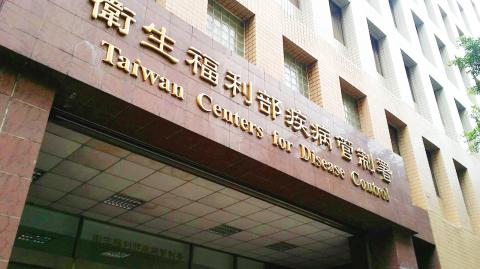The Centers for Disease Control (CDC) yesterday confirmed the first case of indigenous dengue fever in the nation — a young woman in Kaohsiung who was likely infected by a person who contracted the disease in Thailand.
The 20-something woman visited a doctor on Friday after developing symptoms such as fever, headache, muscle and joint pain, and tested positive for the dengue virus, the CDC said in a press release.
She is now in hospital under quarantine, and her house in Singbang Borough (興邦) in the city’s Cianjhen District (前鎮) has been disinfected, it said.

Photo: Lin Hui-chin, Taipei Times
As the woman had not gone abroad recently and people she has had frequent contact with have not exhibited similar symptoms, the CDC said she was likely infected by a man living 143m away in the same borough.
The man on Jan. 9 was confirmed to have caught dengue fever in Thailand, the agency said.
This was the first time in three years that an indigenous case of dengue fever has been reported as early as February, CDC Deputy Director-General Philip Lo (羅一鈞) said, adding that most such cases emerge in May when the weather has turned warmer.
It might have been due to the warmer winter in Kaohsiung, where mosquito activities were not restrained by lower temperatures, Lo said.
As of Sunday, there was one case of indigenous dengue fever and 34 imported cases — 9 from Vietnam, 8 from Indonesia, 7 from the Philippines, 5 from Cambodia, 2 each from Thailand and Malaysia, and 1 from the Maldives, CDC data showed.
Thailand last year reported 87,000 dengue fever cases, which caused 113 deaths, the data showed.
From the start of the year to Jan. 21, it reported 1,700 cases, including one death, the data showed.
People planning to travel to countries that have an dengue fever should watch out for mosquito bites and visit a doctor if they develop a fever, headache or rashes after returning home, the agency said.
In other news, doctors advised the public to monitor their alcohol consumption during the nine-day Lunar New Year holiday, as overconsumption could cause irreparable damage to the pancreas.
Taichung Tzu Chi Hospital Department of Gastroenterology doctor Chou Wei-chiang (周偉強) said that the hospital recently received a patient, a 41 year-old man surnamed Hsieh (謝), who complained of chronic gaseous distention and stomach pain.
After agreeing to an endoscopic retrograde cholangiopancreatography (ECRP), Hsieh was diagnosed with a number of ailments due primarily to repeated inflammation of his pancreas, which led to calcification of his pancreas and pancreatic stones, Chou said.
The inflammation had also caused fibrosis of the pancreatic duct, causing it to contract, he said.
The hospital removed the stones and widened the pancreatic duct, Chou said, adding that Hsieh has recovered and returned to work.
Hsieh’s problems were mainly caused by his drinking habits since he was 15, when he started drinking a bottle of Kaoliang liquor a day, Chou said.
Hsieh said he has had recurring symptoms of an inflamed pancreas since his early 20s, but that he did not seek medical help until his condition began affecting his job.
Additional reporting by CNA

Taiwanese can file complaints with the Tourism Administration to report travel agencies if their activities caused termination of a person’s citizenship, Mainland Affairs Council Minister Chiu Chui-cheng (邱垂正) said yesterday, after a podcaster highlighted a case in which a person’s citizenship was canceled for receiving a single-use Chinese passport to enter Russia. The council is aware of incidents in which people who signed up through Chinese travel agencies for tours of Russia were told they could obtain Russian visas and fast-track border clearance, Chiu told reporters on the sidelines of an event in Taipei. However, the travel agencies actually applied

Japanese footwear brand Onitsuka Tiger today issued a public apology and said it has suspended an employee amid allegations that the staff member discriminated against a Vietnamese customer at its Taipei 101 store. Posting on the social media platform Threads yesterday, a user said that an employee at the store said that “those shoes are very expensive” when her friend, who is a migrant worker from Vietnam, asked for assistance. The employee then ignored her until she asked again, to which she replied: "We don't have a size 37." The post had amassed nearly 26,000 likes and 916 comments as of this

New measures aimed at making Taiwan more attractive to foreign professionals came into effect this month, the National Development Council said yesterday. Among the changes, international students at Taiwanese universities would be able to work in Taiwan without a work permit in the two years after they graduate, explainer materials provided by the council said. In addition, foreign nationals who graduated from one of the world’s top 200 universities within the past five years can also apply for a two-year open work permit. Previously, those graduates would have needed to apply for a work permit using point-based criteria or have a Taiwanese company

The Shilin District Prosecutors’ Office yesterday indicted two Taiwanese and issued a wanted notice for Pete Liu (劉作虎), founder of Shenzhen-based smartphone manufacturer OnePlus Technology Co (萬普拉斯科技), for allegedly contravening the Act Governing Relations Between the People of the Taiwan Area and the Mainland Area (臺灣地區與大陸地區人民關係條例) by poaching 70 engineers in Taiwan. Liu allegedly traveled to Taiwan at the end of 2014 and met with a Taiwanese man surnamed Lin (林) to discuss establishing a mobile software research and development (R&D) team in Taiwan, prosecutors said. Without approval from the government, Lin, following Liu’s instructions, recruited more than 70 software